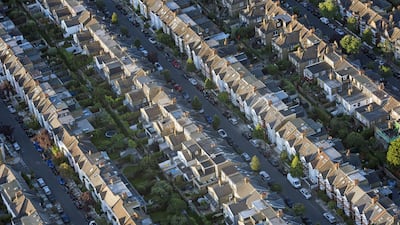The average house price in the UK fell by 3.8 per cent annually in July, the fastest rate in 14 years, as rising borrowing costs dampened demand.
House prices dropped by 0.2 per cent month-on-month in July to reach £260,828 on average.
The decline marks the weakest reading since July 2009, Nationwide Building Society said.
House prices are now 4.5 per cent below the August 2022 peak.
Robert Gardner, Nationwide's chief economist, said: “Investors' views about the likely path of UK interest rates have been volatile in recent months.”
He added: “There has been a slight tempering of expectations in recent weeks but longer-term interest rates, which underpin mortgage pricing, remain elevated.
“As a result, housing affordability remains stretched for those looking to buy a home with a mortgage.
“For example, a prospective buyer, earning the average wage and looking to buy the typical first-time buyer property with a 20 per cent deposit, would see monthly mortgage payments account for 43 per cent of their take-home pay (assuming a 6 per cent mortgage rate).
“This is up from 32 per cent a year ago and well above the long-run average of 29 per cent.
“Moreover, deposit requirements continue to present a high hurdle – with a 10 per cent deposit equivalent to 55 per cent of gross annual average income.”
The Bank of England has imposed 13 consecutive interest-rate increases since the end of 2021, sending the costs of borrowing soaring and straining people’s ability to pay.
In November, Nationwide warned of a potential 30 per cent drop in house prices in a worst-case scenario.
Mr Gardner said a “relatively soft landing is still achievable” while another economist for the lender said that it was now forecasting a peak-to-trough decline of around 6.5 per cent.
“We’re expecting modest falls over the rest of the year,” Senior Nationwide Economist Andrew Harvey told Bloomberg Radio Tuesday.
The 0.2 per cent price fall from June to July followed a 0.1 per cent gain the previous month.
Mr Gardner added that unemployment is expected to remain low and the “vast majority of existing borrowers should be able to weather the impact of higher borrowing costs”.
The Bank of England base rate stands at 5 per cent and is expected to rise further on Thursday as the Bank continues to wrestle with inflation.
Most economists predict rates will rise to 5.25 this week, peaking at 5.75 per cent.
Mr Gardner said: “While activity is likely to remain subdued in the near term, healthy rates of nominal income growth, together with modestly lower house prices, should help to improve housing affordability over time, especially if mortgage rates moderate once (the Bank of England base rate) peaks.”
Mark Harris, chief executive of mortgage broker SPF Private Clients, said: “With another 25 basis points interest rate rise expected from the Bank of England later this week, we are not out of the woods just yet when it comes to rising mortgage costs.
“However, a few lenders, including HSBC, Barclays and Nationwide, have reduced their fixed-rate mortgage pricing on the back of better-than-expected inflation news. This has led to a calming of swap rates, which underpin the pricing of fixed-rate mortgages, after weeks of considerable volatility.”
Nathan Emerson, chief executive of property professionals' body Propertymark, said the number of valuations for sale conducted per branch remaining steady and a “return to normal pace in the market is evident despite continuing economic turbulence”.
John Ennis, chief executive of London estate agent Chestertons, said the capital's property market remained stable throughout July with buyer registrations reaching the same level as in previous months.
“While there were fewer first-time-buyers with support from 'the bank of mum and dad', we witnessed an increase in cash buyers and higher-valued property sales in excess of £1 million.”
He added: “Some buyers who are currently registering are optimistic that we will be seeing more favourable interest rates at some point.”
Nicola Schutrups, managing director at Southampton-based mortgage broker The Mortgage Hut, said: “Further falls in house prices are likely for the rest of 2023 but if inflation continues to come down and the jobs market remains strong, there's still a chance for a soft landing.”
Iain McKenzie, chief executive of the Guild of Property Professionals, said: “The latest inflation figures show some light at the end of the tunnel, and there is still a good chance that the year will be softer on the industry than was previously forecast.”
Gabriella Dickens, senior UK economist at Pantheon Macroeconomics, said: “We think that house prices will have to fall by about 8 per cent from their peak before demand and supply come back into balance.”
Tom Bill, head of UK residential research at Knight Frank, said: “While we expect UK prices to fall by 5 per cent this year, demand should prove more resilient than expected between now and the general election given the cushioning effect of wage growth, high levels of housing equity, lockdown savings, the availability of longer mortgage terms, forbearance from lenders and the popularity of fixed-rate deals in recent years.”


